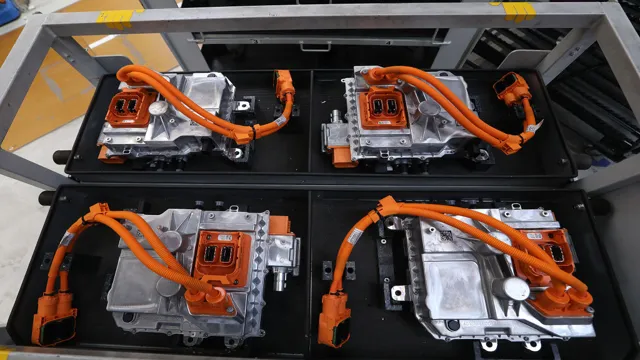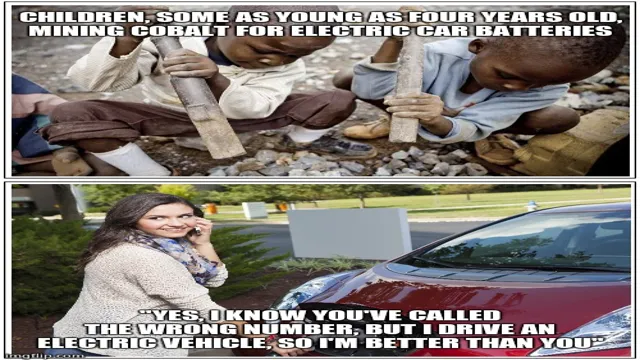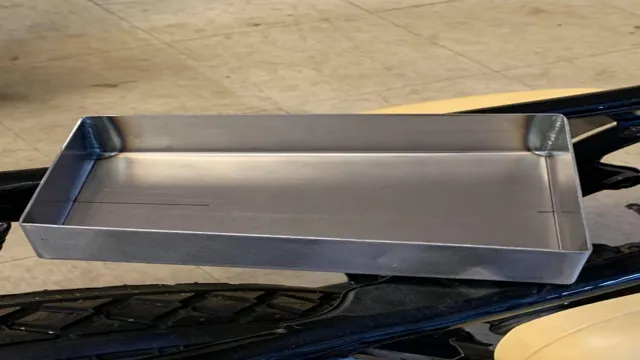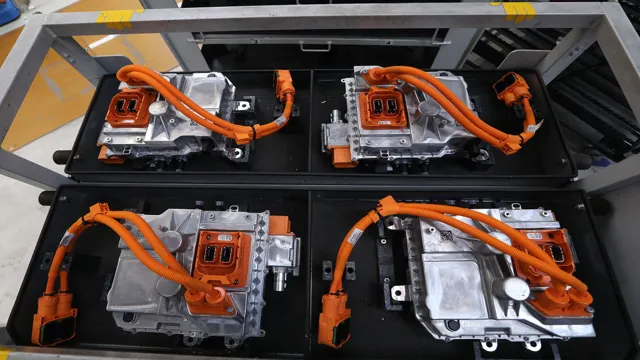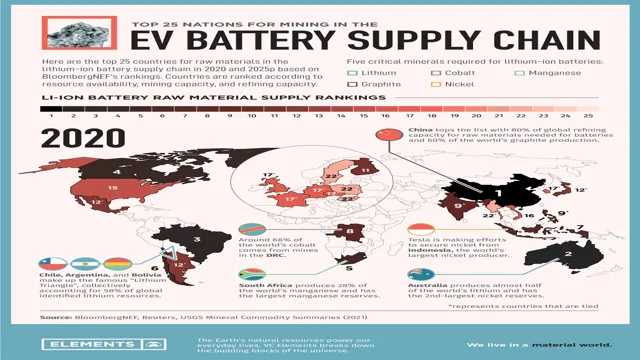The Shocking Truth About Electric Car Batteries: What Are They Made Of?
Electric cars are becoming increasingly popular as people’s awareness of the environmental impact of fossil fuels grows. These vehicles are powered by rechargeable batteries that store the energy needed to run the car. But what are these batteries made of? Electric car batteries are typically made of lithium-ion, which is a type of battery that uses lithium ions to move from one electrode to another.
This is a lightweight and compact material that is ideal for use in electric cars. It is also highly efficient, providing a lot of power while taking up relatively little space. But lithium-ion batteries are not just made of lithium.
They also contain other materials such as cobalt, nickel, manganese, and graphite. These materials help to enhance the performance of the battery, ensuring that it can retain its charge for longer periods and provide the energy needed to power the car. Understanding the materials used to make electric car batteries is not only essential for those who want to buy electric cars.
It is also critical for those who want to reduce their carbon footprint and improve the environment. By opting for electric cars, we can significantly reduce our reliance on fossil fuels, which are known to be a significant contributor to climate change. In conclusion, electric car batteries are made up of a combination of lithium-ion, cobalt, nickel, manganese, and graphite.
These materials work together to create a highly efficient and lightweight battery that can power electric cars effectively. Choosing electric cars over fossil fuel-powered alternatives can significantly reduce our carbon footprint and help to create a cleaner and greener future.
Introduction to Electric Car Batteries
Electric car batteries are the backbone of electric cars and are responsible for powering the vehicle’s electric motors. These batteries are typically made of multiple individual cells that work together to store and discharge electrical energy. The cells contain electrodes made of different materials, such as lithium-ion or nickel-metal-hydride, and are separated by a thin layer known as an electrolyte.
In general, the materials used for making electric car batteries are designed to be lightweight, durable, and efficient in storing energy. Moreover, the size and capacity of the battery play a critical role in determining an electric car’s range. As electric cars continue to rise in popularity, advancements in battery technology will be essential for improving performance, reducing costs, and increasing the range of these vehicles.
What Makes Up an Electric Car Battery
Electric car batteries are an essential component in modern electric vehicles. They store energy and provide the power needed to propel the vehicle. These batteries are composed of several smaller cells, each of which contains electrodes immersed in an electrolyte solution.
The electrodes are usually made of lithium-based materials, which provide a high energy density, making them ideal for electric vehicle applications. The electrolyte solution is a conductive material that allows the transfer of ions between the electrodes, generating electricity. To improve efficiency and increase battery life, electric car batteries are equipped with a battery management system that monitors the state of each cell and optimizes its performance.
These systems help prevent overcharging, overheating, and other issues that could damage the battery and prolong its useful life. In conclusion, electric car batteries are complex but highly efficient components that are key to the performance and success of electric vehicles.
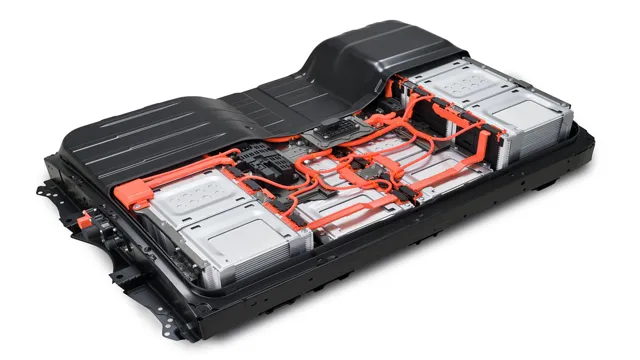
Chemicals Used in Electric Car Batteries
Electric car batteries are a crucial component in providing power to electric vehicles. They are responsible for storing and delivering energy to the electric motor that propels the car forward. These batteries are made up of various types of chemicals and materials, each with their unique properties and benefits.
One of the most common chemicals used in electric car batteries is lithium-ion. This type of battery has a high energy density, which means it can hold a lot of energy in a compact space. This is why lithium-ion batteries are popular for electric vehicles, where space is limited.
Other chemicals used in electric car batteries include nickel-cobalt-aluminum (NCA), nickel-manganese-cobalt (NMC), and lithium-iron-phosphate (LFP) batteries. Each of these chemicals has its strengths and weaknesses regarding energy capacity, lifespan, and cost-effectiveness. Overall, electric car batteries are a vital component in the transition towards a more sustainable and eco-friendly transportation system that can reduce the carbon footprint.
Types of Electric Car Batteries
Electric car batteries come in various types and are built using different materials. Lithium-ion batteries are the most commonly used batteries for electric cars. They are lightweight and have the highest energy density, making them the most efficient.
The batteries consist of a cathode, an anode, and an electrolyte. The cathode is usually made of a lithium compound such as cobalt oxide or nickel manganese cobalt. The anode comprises graphite, and the electrolyte is a lithium salt dissolved in an organic solvent.
Another type of electric car battery is lead-acid batteries. These batteries have been around for a long time and are still used in some electric cars. They have a low energy density and are heavy, but they are also relatively cheap.
Zinc-air batteries are also emerging as a promising technology for electric cars. These batteries use oxygen from the air to generate electricity and have a high energy density. However, they are still in the development stage and are not yet widely used.
In summary, electric car batteries are made up of various materials, but the most commonly used type is the lithium-ion battery.
Lithium-ion Batteries
Lithium-ion batteries are the most commonly used type of battery in electric cars. They are lightweight, which ensures that they don’t add much weight to the car’s overall weight, which makes them ideal for electric cars. Lithium-ion batteries can be fast-charged, which means that electric cars can be charged quickly and easily, making them more practical for long-distance travel.
They can also hold more energy, which means that they can go further without needing to be charged. The type of electric car battery can have a significant impact on the performance of the car, and the lithium-ion battery is one of the best options for electric cars. However, there are other battery types used as well, and the choice depends on various factors such as cost, performance, and energy density.
Nickel-metal Hydride Batteries
Nickel-metal hydride batteries are one type of electric car battery that is commonly used. These types of batteries have a lower environmental impact than traditional lead-acid batteries but are still affordable and reliable. They also have a higher energy density than lead-acid batteries, which means they can store more power in a smaller package.
Nickel-metal hydride batteries are also less susceptible to memory effect, which is when a battery loses its ability to hold a full charge over time. This makes them an ideal choice for electric cars, as they can maintain their charge capacity for longer periods of time. Overall, nickel-metal hydride batteries provide a good balance between cost, performance, and sustainability, making them a popular choice for many electric car manufacturers.
Lead-acid Batteries
Lead-acid batteries are one of the oldest and most common types of batteries used in electric cars. They are affordable and have proven to be reliable over time. Lead-acid batteries are made up of lead and sulfuric acid, and they store energy by converting chemical energy into electrical energy.
Although they are durable and easy to work with, they have limited storage capacity and can be quite heavy. This limits their application in electric cars, and they are typically only used in smaller vehicles like golf carts. Despite their limitations, lead-acid batteries are still widely used in hybrid electric vehicles because they can recover some of the energy that would otherwise be lost during braking.
They are also easily replaceable, making them a popular choice for many consumers.
Sustainability of Electric Car Batteries
Electric car batteries are a crucial component in the shift towards sustainable transportation. These batteries are typically made of lithium-ion, a metal that is known for its high energy density and ability to retain a charge. Lithium-ion batteries are composed of a cathode, an anode, and an electrolyte, which work together to generate an electric current.
The materials used in these batteries include graphite, cobalt, nickel, and manganese. While lithium-ion batteries are relatively expensive to produce, they are highly efficient and can be recharged many times before their performance begins to degrade. However, there are concerns about the environmental impact of electric car batteries due to the extraction and disposal of the metals involved.
As such, researchers are exploring alternative options such as solid-state batteries and alternatives to cobalt and other rare metals in order to create more sustainable and eco-friendly batteries for electric vehicles.
Recyclability of Electric Car Batteries
Electric car batteries have been hailed as the future of the automotive industry, thanks to their efficiency and low carbon emissions. However, sustainability is an essential aspect to consider when it comes to the production and disposal of these batteries. Fortunately, most electric car batteries are recyclable, which is excellent news for the environment.
Recycling helps conserve the earth’s resources and reduces waste. These batteries contain various valuable materials like lithium, cobalt, and nickel, which can be reused in manufacturing new products. By recycling these batteries, we can reduce the need for mining new materials, which can have devastating effects on the environment.
However, not all electric car batteries are created equal, and not all of them are recyclable. Therefore, it’s crucial to choose electric cars with recyclable batteries and ensure proper disposal of used batteries to minimize environmental degradation. Overall, electric cars with recyclable batteries offer a sustainable solution to the automotive industry, reducing the carbon footprint and preserving the earth’s resources for future generations.
Second Life of Electric Car Batteries
Electric car batteries are the backbone of electric vehicles, providing reliable and sustainable energy to power them. However, most of us are unaware of what happens when these batteries eventually reach the end of their life cycle. The good news is that electric car batteries are designed to last longer than traditional automobile batteries, and they can still be used for other purposes even after their power storage capability has declined.
The second life of electric car batteries is all about sustainability, and these batteries can be re-utilized for other applications such as stationary energy storage, electric grid support, or backup power for residential homes. Companies like Tesla and Nissan are already exploring new ways to extend the life cycle of electric car batteries and make use of their full potential. By doing so, we can reduce waste, decrease the demand for raw materials used in producing new batteries, and create a more sustainable energy ecosystem.
By reusing electric car batteries, we can make sure that their environmental impact is minimized even after their primary use as an energy source for vehicles has ended.
Conclusion: The Future of Electric Car Batteries
In conclusion, electric car batteries are not just made of plain old Duracells! They are actually composed of advanced lithium-ion technology, which utilizes a variety of metals and chemicals to create a powerful and long-lasting energy source. So next time you see an electric car whizzing by, remember that it’s not just cutting down on emissions, but it’s also powered by some seriously cool and complex science.”
FAQs
What materials are electric car batteries made of?
Electric car batteries are typically made of lithium-ion cells, which contain materials such as lithium, cobalt, nickel, and manganese.
How do electric car batteries differ from traditional car batteries?
Electric car batteries are designed to provide sustained power over longer periods of time, whereas traditional car batteries are intended for shorter bursts of energy to start the engine.
How long do electric car batteries last?
The lifespan of an electric car battery varies depending on several factors, such as the type of battery, driving habits, and maintenance. Generally, electric car batteries can last anywhere from 5 to 20 years.
Can electric car batteries be recycled?
Yes, electric car batteries can be recycled. The materials contained within lithium-ion cells, such as lithium, cobalt, and nickel, can be recovered and reused in new batteries or other products.
